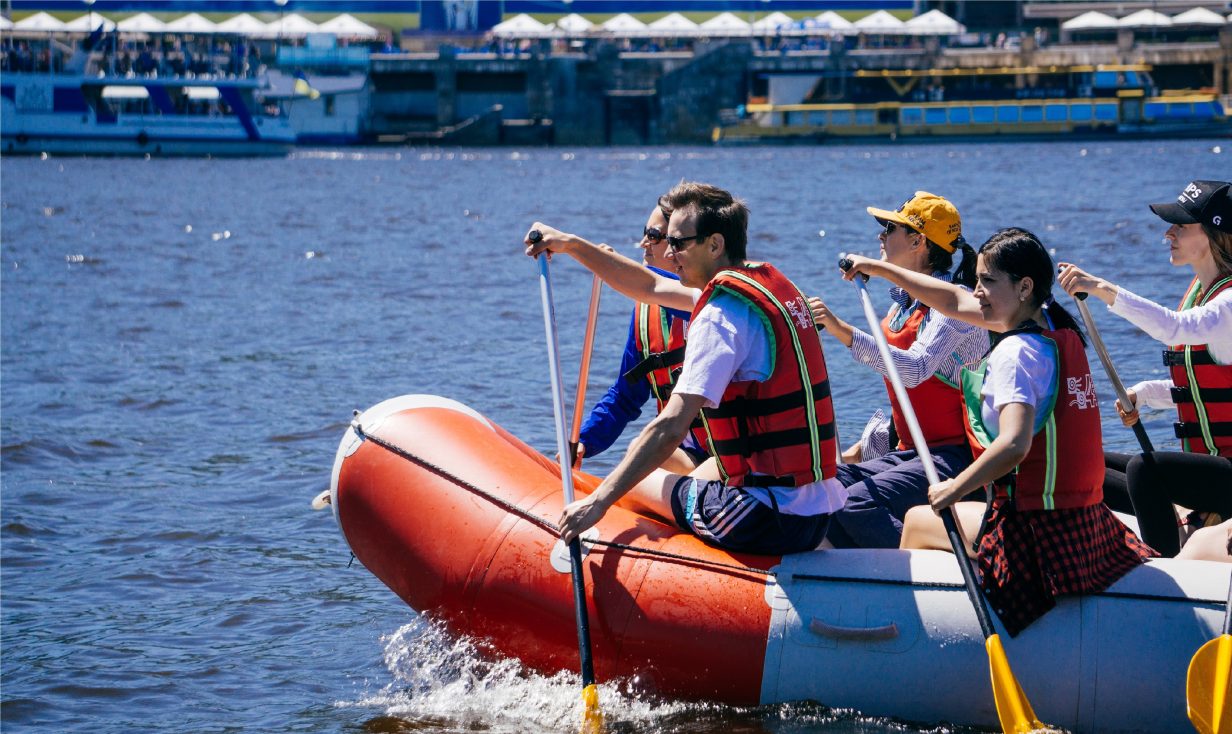
26.2 Modal Constructions (треба and можна)
In this module, you will learn how to express necessity, possibility, permission, and prohibition by means of impersonal modal constructions with тре́ба and мо́жна.
Завдання 1
Select the most fitting solution to each problem listed below. Then answer the questions that follow.
Важли́во!
Just like the verb му́сити, тре́ба conveys strong necessity. However, because тре́ба is not a verb, but rather a word similar to an adverb, it never changes its form. Тре́ба can be translated as “it is necessary” or “one must.” It is used in the so-called impersonal constructions that don’t have a subject:
Тре́ба ляга́ти спа́ти. (It’s necessary to go to bed.)
When it is important to indicate for whom a certain action is necessary, this person will be referred to in the sentence with a dative-case form – just as in sentences about someone’s age or those with the verb подо́бається (see module 15.1 for those constructions as well as the dative forms of pronouns):
Мені́ тре́ба бі́льше гуля́ти. (Literally: It’s necessary for me to go for a walk more.)
Мари́ні тре́ба купи́ти нови́й комп’ю́тер. (Literally: It’s necessary for Maryna to buy a new computer.)
Тре́ба is followed by the infinitive of a verb to express the need to perform some action.
Завдання 2
For each statement you hear, select who must engage in the stated action. Then answer the questions that follow.
Завдання 3
Read the dialogue below the image and answer the questions about it that follow.
– Алло́! Приві́т, Ю́лю!
– Приві́т, Хри́стю! Ти де?
– Я на база́рі. Тобі́ не тре́ба помідо́рів? Тут є ду́же га́рні деше́ві помідо́ри.
– Ти зна́єш, тре́ба! Ти мо́жеш купи́ти для ме́не два кілогра́ми?
– Мо́жу, звича́йно! А виногра́д? Тобі́ не тре́ба виногра́ду?
– Ні, дя́кую! Виногра́ду не тре́ба.
Ціка́во!
Тре́ба can also be followed by a direct object (noun, noun phrase, or pronoun) to express one’s need of something:
Нам тре́ба книжко́ву ша́фу. (We need a bookcase.)
In questions about one’s need of something, especially when offering this item, тре́ба is often preceded by the particle не to make the question less direct and therefore less imposing:
Вам не тре́ба при́нтера? У ме́не є два. (You don’t need a printer, do you? I have two.)
In affirmative sentences with тре́ба, the object or person needed is a direct object and it will appear in the accusative case. If тре́ба is used with не, the direct object will appear in the genitive case (see module 5.3 and module 5.4 for genitive case after negation).
Завдання 4
Read the conversation below and fill in the blanks with the most appropriate words from the bank.
Завдання 5
Read the conversation below and mark all words expressing possibility. Then answer the questions that follow.
Важли́во!
In one of its meanings, мо́жна conveys possibility (see Завдання 7 below for its other meaning). Just like тре́ба, мо́жна is a word similar to an adverb, so it never changes its form. Мо́жна can be translated as “it is possible” or “one can.” Like тре́ба, it is used in the impersonal constructions that don’t have a subject:
Там мо́жна ката́тися на ли́жах або́ сноубо́рді. (One can ski or snowboard there.)
When it means “it is possible,” мо́жна is never used with the person for whom the action is possible. When it is important to indicate the person, the verb могти́ is used instead:
Тут мо́жна купи́ти велосипе́д. (One can buy a bike here.)
Тут ви мо́жете купи́ти велосипе́д. (You can buy a bike here.)
Мо́жна is most often followed by the infinitive of a verb.
Завдання 6
Fill in the blanks in the sentences below with the most appropriate words from the bank.
Завдання 7
Look at the images and their captions, and answer the questions about them below.
 – Скажі́ть, будь ла́ска, в цьо́му о́зері мо́жна пла́вати? – На жаль, не мо́жна. |
 – Скажі́ть, будь ла́ска, в пала́ці мо́жна фотографува́ти? – Не ті́льки мо́жна – тре́ба! Диві́ться, яки́й він га́рний! |
Ціка́во!
In yes-no questions, мо́жна is used to inquire whether something is allowed:
Тут мо́жна лови́ти ри́бу? (Is fishing allowed here?)
In such questions, мо́жна can be followed by a noun or noun phrase in the function of the direct object:
Мо́жна пита́ння? (May I ask a question?)
To say “yes,” one can respond simply with “Мо́жна.”
The response “Не мо́жна” means “It’s prohibited.”
Завдання 8
Select the most appropriate answer to each question you hear.
Мовний пазл
Look through the activities you have just completed and choose the correct statements to summarize what you have learned.
А тепер тест!
Fill in the blanks in the dialogue below with either треба or можна.



